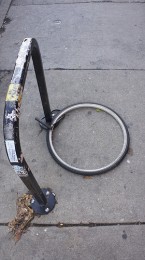The Economics of Stealing a Bike

The Priceonomics tumblr posted a fascinating, extensive look into the economics of bike thievery, and why it’s such a rampant crime when there’s so little return on investment:
Criminal activity (especially crime with a clear economic incentive like theft) could therefore be modeled like any financial decision on a risk reward curve. If you are going to take big criminal risk, you need to expect a large financial reward. Crimes that generate more reward than the probability weighted cost of getting caught create expected value for the criminal. Criminals try to find “free lunches” where they can generate revenue with little risk. The government should respond by increasing the penalty for that activity so that the market equilibrates and there is an “optimal” amount of crime.
Using this risk-return framework for crime, it begins to be clear why there is so much bike theft. For all practical purposes, stealing a bike is risk-free crime. It turns out there is a near zero chance you will be caught stealing a bike and if you are, the consequences are minimal.
My bike has never been stolen (knock on wood), but I also keep it in my apartment and barely ever ride it so, uh, there you have it.
Photo: Funny_Color
Support The Billfold
The Billfold continues to exist thanks to support from our readers. Help us continue to do our work by making a monthly pledge on Patreon or a one-time-only contribution through PayPal.
Comments